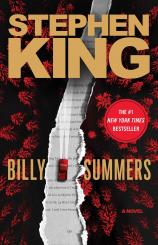Reading Group Guide
Discussion Questions
Billy Summers

1. When interacting with others, Billy takes the precaution of projecting his “dumb self,” comparing it to a seatbelt. What do you think of this method of protecting oneself? Have you, or anyone you know, done anything similar?
2. In Chapter 5, Billy plays Monopoly with his David Lockridge neighbors, the Ackermans. During the game, he explains Hobson’s Choice, which means having to “decide between taking a chance or standing pat.” In what ways does this choice manifest throughout the book?
3. As Billy continues to write the story of Benjy Compson, in reality his story, he suddenly realizes that “he wants to be read” and that “any writer who goes public with his work is courting danger. It’s part of the allure. Look at me. I’m showing you what I am. My clothes are off. I’m exposing myself.” Despite being adept at hiding his true identity, it seems he wants to be known. Discuss why Billy specifically feels this way and why writers in general may crave this type of acknowledgment.
4. As an assassin, Billy maintains several undercover identities and social lives to hide in plain sight. How might these skills translate to writing skills? What else about Billy’s background makes him a surprisingly good writer, despite his lack of experience?
5. In Chapter 6, Billy has a conversation with Colin White where Colin shows how he changes to his aggressive lawyer persona, which confuses Billy as to whether he is “a good person or a bad one.” What do you make of Billy’s tendency to think in black and white? How might he be different if he allowed for gray areas? How might the story be different?
6. As Dalton Smith, Billy gets to know Beverly and Don Jensen, the couple who lives in the apartment upstairs. After Beverly’s mother passes away and leaves them $200,000, they exit the active story, going on vacation long-term, which helps out Billy but also makes him think about what his pay is really worth. What did this subplot add to the story overall? How does it impact Billy?
7. Chapter 10 is when the assassination of Joel Allen takes place. Discuss your experience reading through this chapter. How did you feel while reading? Was there anything that alerted you that something might be off? Discuss how King handles the suspenseful moments and deeply engages you.
8. Billy is known among his colleagues for asking if his targets are “bad men.” Later on, he has the following exchange with Alice:
“If [Tripp] was hurt that would make me happy. I suppose that makes me a bad person.”
“It makes you human,” Billy says. “Bad people need to pay a price. And the price should be high.”
What is your opinion on Billy’s moral code? How do you feel about the way he took revenge on Alice’s rapists? Was he justified, or do his actions also make him a bad man?
9. We learn about Billy’s military background by reading sections of the story he writes. What do these sections add to your understanding of Billy overall, and how does that inform your understanding of his actions in the present?
10. Clay Briggs, Billy’s military buddy, teaches Billy two methods of calming panic attacks during their time in Fallujah, which Billy passes on to Alice: placing a wet washcloth over your face and singing “The Teddy Bears’ Picnic” lyrics. Would you try these methods yourself? What do you think of the way mental health and psychological healing are dealt with in this story?
11. Bucky Hanson is mostly in the background throughout the story until Billy and Alice drive out to meet him toward the end of the novel. Billy calls him the only person he trusts completely. What is your impression of Bucky? How does King effectively make him come across as a trustworthy person. Did you ever distrust him?
12. When Billy and Alice go to confront Roger Klerke, the big bad guy of the story, Alice shoots and kills him instead of Billy. What does it mean to you that Alice is the one to take vengeance? What does this mean for the story overall?
13. Think about Billy’s final words to Alice and how he sets her up mentally and financially to begin a new life. What was your reaction to his speech? What do you think about Billy and Alice’s relationship? What kind of love did they share?
14. In the final pages of the book, Alice says, “Did you know that you could sit in front of a screen or a pad of paper and change the world? It doesn’t last, the world always comes back, but before it does, it’s awesome. It’s everything.” What do you think of this concept? Of the power of writing and storytelling? What is it worth?







